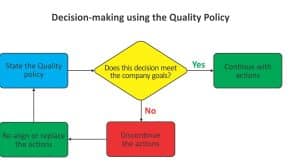Quality Policy Requires Consistent Quality Objectives and Planning for Sustaining Business
Mark Eydman, CQP MCQI, Managing Director at Six Pillars Consulting, considers how organisations can measure, respond to, and develop customer loyalty to support sustainable, profitable growth.
The CQI describes quality as the process of making organizations perform for their stakeholders, and most would agree that customers are among the most important of those stakeholders.
If organisations respond to this challenge and invest focus and resources into the delivery of high value products, services and solutions, it is fair to consider the reward that will accrue as a result and how this might be leveraged for future business success.
While some organisations may not consider success in financial terms, for many it will be measured through sales, revenues and profitability. These metrics, though, are not perfect, and at some levels can be influenced by macro-economic factors or simply the natural spending cycles of key clients.
A far more reliable and enduring reward for organisations in response to their commitment to quality is customer loyalty – which might be considered as the state where a customer believes that their ongoing relationship with you is in their continued best interest.
While this narrative is based on commercial organisations, others, including voluntary, community and governmental organisations, can progress an adapted approach – valuing outcomes for their ‘customers’ in similar terms.
Customer focus
So, why should a quality professional contribute to the measurement, analysis and improvement of customer loyalty within their organisations? While quality professionals take many forms, what tends to unite them is their commitment to ensuring that stakeholders are well served and, as we have said, customers are perhaps the most important of this group.
With a broad range of skills and a focus on governance, assurance and improvement, quality professionals are both well-placed and equipped to be the effective and independent voice of the customer. By recognising the contributors to customer loyalty and building those into formal processes and using quality tools and techniques to address sources of concern, the quality professional will complete their direct remit and also be a contributor to broader organisational success.
This focus on customer loyalty does not sit in a KPI bubble. It is highly likely that customer loyalty or some variant will be described within the organisational vision or associated values. Too often, however, there is little focused activity to move towards that expressed desired state. Though, the quality professional can leverage many of the levers at their disposal to make a positive contribution.
Under the guidance of ISO 9001:2015, a quality policy, aligned with an organisations purpose, context and strategic direction, requires consistent quality objectives and planning to achieve them. This combined with a requirement to be customer focused and to gather customer feedback including, but not limited to, complaints, provides a powerful framework for determining what needs to be done to develop customer loyalty.
Taking the right approach
The gathering of customer feedback however, can be problematic. Typically, surveys tend to be too long, poorly written, use ineffective media and open to manipulation of various forms. These challenges are easily addressed and can lead to high levels of customer engagement and rich responses that can be used to drive impactful actions in response. I would strongly advocate adding customer-loyalty-based competences into role descriptions to allow for these necessary skills to be developed.
With a strong value proposition in place, most organisations require a focus on effective methods of working, employee engagement and customer focus to succeed. I am often asked where to start if one suspects work to be needed in all three areas. While a quality professional can assist in all those areas, start by gaining some customer feedback and acting on it.
Attribute to original publisher/ publishing organization: Mark Eydman, CQP MCQI, Managing Director at Six Pillars Consulting, https://www.quality.org/knowledge/customer-loyalty-and-role-quality-professional

